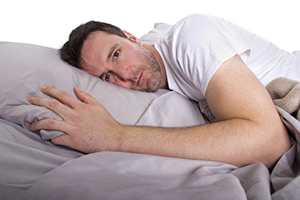 If you suffer from any kind of chronic pain, most likely you’re taking specific a type of painkiller.
If you suffer from any kind of chronic pain, most likely you’re taking specific a type of painkiller.
But a new study reveals these specific painkillers can lead to sleeplessness and even sleep apnea. Which then again worsens your pain so you need more of these painkillers.
One of the standard treatments for chronic pain is an opioid prescription. These drugs include codeine (the weakest one), morphine, hydrocodone, oxycodone, and fentanyl.
In addition to the myriad digestive consequences opioids cause, another terrible condition resulting from chronic opioid use is obstructive sleep apnea.
If this weren’t enough, it’s frequently accompanied by poor sleep and daytime fatigue.
From previous studies on healthy people, it seems as if poor sleep causes an increase in pain sensitivity. Luckily for them, their pain threshold can be returned to normal by restoring their good quality sleep.
If poor sleep quality causes people in chronic pain to be more sensitive to pain too, this places them on a downward spiral:
1. They are in pain, for which they use opioids.
2. The opioids lead them to develop sleep apnea and thereby destroy their ability to get good quality sleep.
3. The worse they sleep, the more pain they experience and the more opioids they use.
4. The more opioids they use, the worse their sleep apnea and sleep quality become.
5. The worse their sleep quality gets, the more pain they feel and the more opioids they want to use, and so on.
Researchers recently published an article in the Journal of Clinical Sleep Medicine that identified American military veterans as a group especially at risk because of the chronic pain from which they suffer.
They analyzed data collected of veterans who presented at the Western New York Healthcare System sleep clinic between 2012 and 2014 with chronic pain, opioid prescriptions, and sleep apnea.
They then compared the pain score each of these patients received before a course of continuous positive airway pressure (CPAP) with the scores they received afterwards.
In addition, they checked whether any of these veterans reduced or dropped their opioid consumption after the CPAP.
Regrettably, the CPAP reduced neither the pain nor the opioid use, even though the veterans were sleeping better.
This means that, while improving sleep, CPAP cannot improve the pain threshold of people with chronic pain who are taking opioids.
Another alarming finding was the discovery that opioid-dependent veterans did not comply with the CPAP as well as the non-opioid takers did, explaining why they benefited from it much less.
These conclusions suggest that it is a bad idea to take chronic opioids, as they may cause sleep apnea.

 Overcoming IBD
Overcoming IBD Multiple Sclerosis
Multiple Sclerosis Banishing Bronchitis
Banishing Bronchitis Gum Disease Gone
Gum Disease Gone Overcoming Onychomycosis
Overcoming Onychomycosis Neuropathy No More
Neuropathy No More The Prostate Protocol
The Prostate Protocol Brain Booster
Brain Booster
 Ironbound
Ironbound
 Solution for Shingles
Solution for Shingles
 The Bone Density Solution
The Bone Density Solution
 The Ultimate Healing Protocol
The Ultimate Healing Protocol
 The Parkinson's Protocol
The Parkinson's Protocol
 The Chronic Kidney Disease Solution
The Chronic Kidney Disease Solution
 Overthrowing Anxiety
Overthrowing Anxiety The Fatty Liver Solution
The Fatty Liver Solution The Hypothyroidism Solution
The Hypothyroidism Solution
 The End of Gout
The End of Gout The Blood Pressure Program
The Blood Pressure Program
 The Oxigized Cholesterol Strategy
The Oxigized Cholesterol Strategy
 Stop Snoring And Sleep Apnea Program
Stop Snoring And Sleep Apnea Program
 The Arthritis Strategy
The Arthritis Strategy The Vertigo & Dizziness Program
The Vertigo & Dizziness Program The 3-Step Diabetes Strategy
The 3-Step Diabetes Strategy Hemorrhoids Healing Protocol
Hemorrhoids Healing Protocol The Erectile Dysfunction Master
The Erectile Dysfunction Master Weight Loss Breeze
Weight Loss Breeze The IBS Program
The IBS Program The Insomnia Program
The Insomnia Program The Migraine and Headache Program
The Migraine and Headache Program The Neck Pain Solution
The Neck Pain Solution The Menopause Solution
The Menopause Solution The Ejaculation Master
The Ejaculation Master The TMJ Solution
The TMJ Solution The Acid Reflux Solution
The Acid Reflux Solution The Fibromyalgia Solution
The Fibromyalgia Solution The Psoriasis Strategy
The Psoriasis Strategy